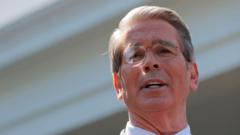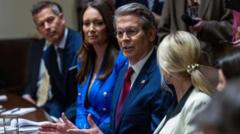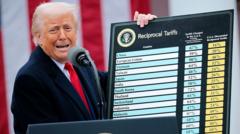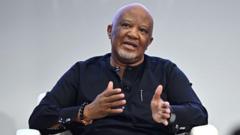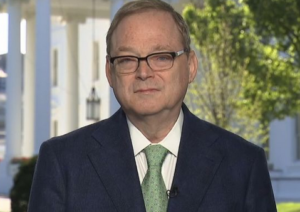In Windsor, Ontario, the heart of Canada's automotive production, workers are expressing fears and anxiety over new US tariffs that threaten their livelihoods. With a history deeply intertwined with the auto industry, these workers are worried about the broader economic ramifications of trade tensions, and the upcoming Canadian election has brought new focus on potential policy responses.
Auto Workers in Windsor Face Uncertainty Amid US Tariffs
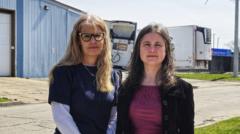
Auto Workers in Windsor Face Uncertainty Amid US Tariffs
As the automotive industry braces for the impact of new US tariffs on imported vehicles, workers in Windsor, Canada's auto capital, express deep concerns about their job security and economic future.
In Windsor, Ontario, which plays a pivotal role in Canada's automotive landscape, workers are facing uncertainties as new tariffs imposed by the United States threaten to disrupt their livelihoods. Auto workers Kathryn and Chad Lawton, with family histories deeply entrenched in Ford's production legacy, view these tariffs as a direct challenge to their heritage and economic stability. Their hometown, a mere bridge away from Michigan, has been dubbed "Ford City," symbolizing its long-standing connection to the auto industry.
Chad Lawton, who has dedicated over three decades to Ford, describes the current environment as unprecedented, heightening levels of anxiety among employees. "This feels the same," he noted, drawing parallels with the turmoil of the 2008 financial crisis, where US auto manufacturers received government bailouts to avoid bankruptcy. Many fear that these tariffs, which impose a hefty 25% tax on foreign-made vehicles, could trigger a recession and further jeopardize their jobs.
With approximately 24,000 individuals employed directly in the sector and an estimated 120,000 others reliant on automotive production, the potential fallout would reverberate throughout the Windsor-Essex community. Local businesses, including restaurants and retailers, are anxiously watching the developments, fearing a downturn in their customer base.
John D'Agnolo, president of Unifor Local 200, articulates a sense of despair among union members, imploring them to prioritize rent and groceries over unnecessary purchases. Workers like Austin Welzel and Christina Grossi express feelings of betrayal, viewing the tariffs as a stab in the back from the US, their closest ally. For many, the threat of losing their jobs also means forfeiting their sense of pride and achievement in the manufacturing process.
The looming Canadian federal election is significantly shaped by these economic concerns, with various political leaders proposing plans aimed at supporting the auto industry and addressing vulnerabilities in the sector. Current Prime Minister Mark Carney has put forth a $2 billion fund to bolster competitiveness and protect jobs, while his main rival, Conservative leader Pierre Poilievre, focuses on tax relief initiatives for affected companies. Additionally, NDP leader Jagmeet Singh advocates for using counter-tariff revenues to support impacted workers.
As Windsor continues to grapple with the implications of US tariffs, the sentiment among its residents is one of apprehension and uncertainty. The Penalty Box, a local eatery popular with Fiat Chrysler workers, reveals that the atmosphere is tense; if the automotive sector suffers, the ripple effects will likely hit the entire community hard. Business owners share concerns about maintaining their workforce if production declines.
Chad Lawton, reflecting on the precarious situation, hopes for diplomatic negotiations, maintaining that Canada must stand firm while still seeking remedies. "I have never seen anything close to this," he laments, highlighting the urgent need for clarity and stability in the economic landscape that has supported Windsor for generations.


